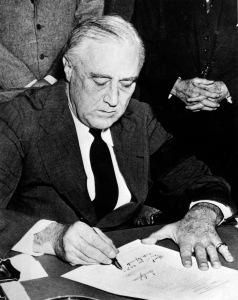When Sitting on the Fence is Not an Option

Is it OK just to sit on the fence in a world gone mad?
Confession: As an American, I don’t like getting involved with the problems of other countries. I don’t want to be the world’s police force.

There’s a precedent for that sentiment. In 1935. Franklin D. Roosevelt signed the neutrality act. Two European leaders—Hitler and Mussolini—were beginning to rear their fascist heads and rattle their swords, but FDR was determined to keep us out of whatever was brewing in Europe.
Most Americans agreed: Let’s be neutral. And George Washington would’ve agreed too.
In 1793, Washington issued the Proclamation of Neutrality, declaring that the United States would remain neutral in the conflict between France and Great Britain. Our country was divided between those who wanted to support Britain, and those like Thomas Jefferson who wanted to support the French. (After all, it was the French who helped us in our own fight with the British.) But Washington remained adamant: it’s not our continent. It’s not our war.
Washington’s issue was not simply with Britain or France. It was with any long-term entanglements—whether friendly or hostile—because such relations would cloud our judgment. I like the idea of keeping our nose out of other countries’ business, but our world is significantly smaller now. Satellites, air travel, and technology have made our world extremely small. When one country falls politically or economically, it has a domino effect. I can bury my head in whatever sand I find in Middle Tennessee, but I am still affected. However, I’m not here to discuss the pros and cons of national neutrality; I want to take this to a personal level.
As a follower of Christ, I cannot be neutral to those around me. I cannot pretend I see no injustice. Of course, I can’t step in and feed every homeless person … stand up for every bullied and harassed person … or right every wrong in a sin-filled and unjust society—but I can do something.

Martin Niemöller was a German pastor in Nazi Germany. He initially supported Hitler and shared some of his anti-Semitism. However, Niemöller changed his tune and became an outspoken critic of Hitler. Consequently, he spent seven years in a concentration camp. He survived and, after the war, he often shared this poem.
First they came for the Socialists, and I did not speak out—
Because I was not a Socialist.
Then they came for the Trade Unionists, and I did not speak out—
Because I was not a Trade Unionist.
Then they came for the Jews, and I did not speak out—
Because I was not a Jew.
Then they came for me—and there was no one left to speak for me.
I can’t be neutral.
If anyone has this world’s goods and sees a fellow believer in need but withholds compassion from him — how does God’s love reside in him? Little children, let us not love in word or speech, but in action and in truth” (1 John 3:17-18).
I can’t be neutral.
“Carry one another’s burdens; in this way you will fulfill the law of Christ” (Gal. 6:2).
I can’t be neutral.
Doing what is righteous and just is more acceptable to the Lord than sacrifice” (Prov. 21:3).
I can’t be neutral.
I honor Christ as I honor others by stepping in … supporting them … walking with them in whatever they face. I can be the hands and feet of Christ.
Subscribe to this blog at the top of the page! And spread the word by sharing this post with others.
For a printable version: click here.
 This post supports the study “Pray for Your Neighbor” in Bible Studies for Life and YOU.
This post supports the study “Pray for Your Neighbor” in Bible Studies for Life and YOU.
Podcast
Join Lynn Pryor and Chris Johnson as they discuss this topic:
https://ministrysites.s3.amazonaws.com/podcasts/bsfl_adults/BSFL_ADULTS_SUM22_U2S4.mp3











